
[Podcast #325] The Myth of Magicmaking
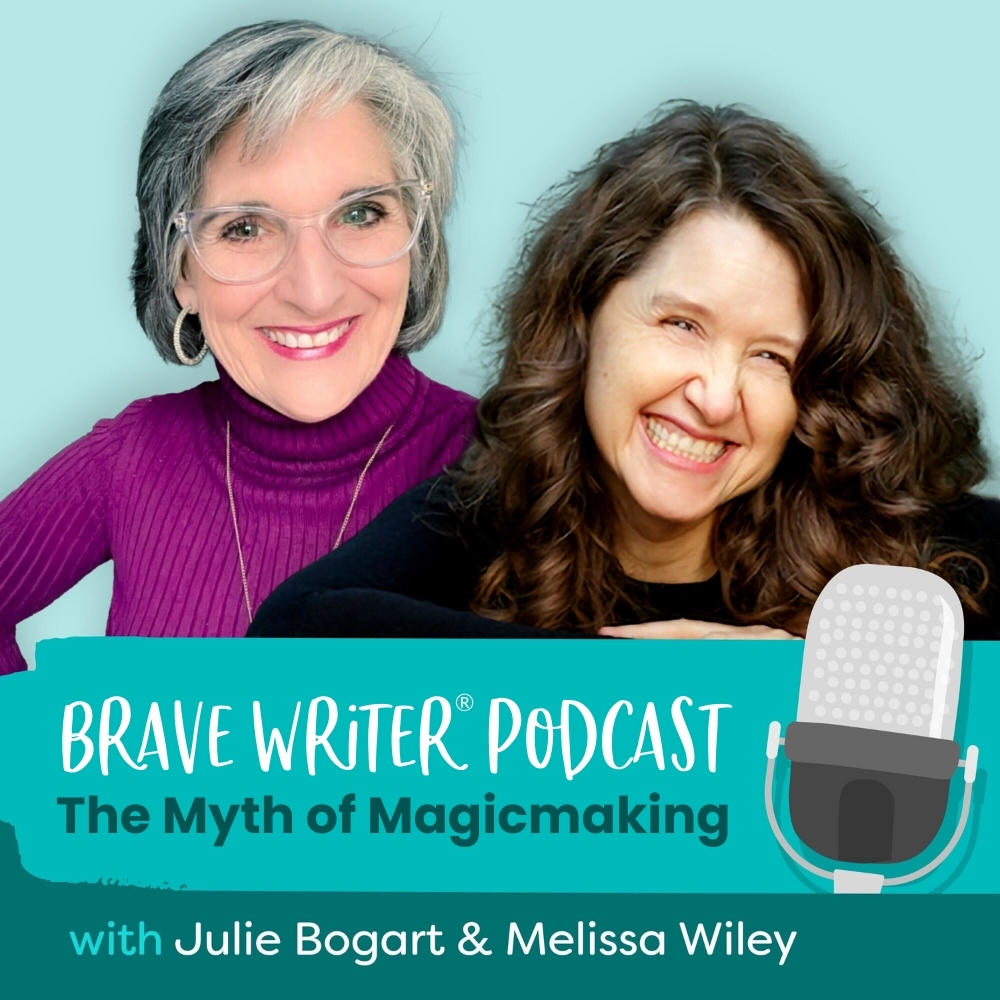
What if enchanting learning didn’t require themed parties, elaborate prep, or constant performance?
In this Brave Writer podcast episode, we unpack the myth of “magicmaking” and show why real enchantment is rooted in connection, not production. We share simple, practical ways to revive lessons that feel stuck, from eye contact and movement to snacks, forts, music, and letting kids take the lead.
Along the way, we explore how curiosity, comfort, and collaboration create learning that actually sticks. If you’ve been feeling burned out or pressured to “make school magical,” this conversation offers a deep exhale and a fresh way forward. Join us and rediscover how easy magic can be.
Show Notes
Many homeschooling parents quietly carry the belief that learning should feel magical all the time—and that if it doesn’t, something has gone wrong. When lessons fall flat, the instinct is often to add more: more prep, more creativity, more performance. But what if the problem isn’t a lack of magic at all?
What we’ve discovered is that the real myth lies in thinking enchantment comes from production. True magic in learning doesn’t grow out of themed parties or elaborate setups. It grows out of connection.
Connection Before Curriculum
When learning starts to feel sour, our first move isn’t to decorate the room or invent a clever hook. It’s to reconnect. Something as simple as making eye contact, sitting at the same level, and asking a genuine question can shift everything. That moment of being seen changes the tone from compliance to collaboration.
This is the heart of the magic described in The Brave Learner: learning thrives when relationship comes first. Without that relational foundation, even the most creative activity can feel hollow.
Learning Lives in the Body
One of the most overlooked tools in homeschooling is the body itself. Children learn with their whole selves, not just their minds. Chewing something crunchy, stretching before math, rolling on the floor, or jumping while memorizing facts can restore focus far more effectively than insisting on stillness.
These aren’t distractions. They are supports. Movement, touch, and sensory input help regulate attention and make learning feel possible again.
Changing the Space Without the Pressure
Environment matters too—but not in the way we often imagine. Rearranging furniture, building a fort, moving to the couch, or taking schoolwork to a coffee shop introduces novelty without pressure. Kids respond to surprise and ownership. When they help create the space, they’re far more willing to enter the work.
None of this has to be permanent. These shifts are seasoning, not structure. A little novelty can revive energy without becoming a new obligation.
Change the Tools, Not the Task
We also underestimate how powerful it is to change the materials instead of the lesson. Glitter pens, whiteboards, clipboards, oversized paper, or tiny notebooks can make familiar work feel new again.
The learning hasn’t been diluted. It’s been invited back in.
Let Your Child Be the Expert
One of the most effective enchantment tools is letting children teach. When kids become experts—on panda bears, base-12 math, a video game, or a favorite book—their confidence blooms. Our role shifts from referee to curious listener.
Children love being taken seriously. Leading with curiosity instead of correction often opens doors into subjects they previously resisted.
Permission Is Powerful
Not every subject needs to happen every day. Skipping handwriting occasionally, doing math orally, or declaring a “no worksheets” day can release tension instantly. Pressure rarely produces understanding. Relief often does.
Sometimes the most enchanting thing we can offer is permission: permission to trace, to play quietly, to think invisibly. Learning doesn’t always look productive from the outside, but thinking is still happening.
What Kids Are Really Learning
When kids are bored, angry, or shut down, they’re learning something—just not what we intended. They may be learning that math is miserable, that learning requires obedience, or that their experience doesn’t matter.
Connection Changes the Lesson Entirely
Enchantment, in the end, is simply forming a relationship: with a subject, with an idea, and with each other. That kind of magic doesn’t require a party. It just asks us to show up—curious, present, and willing to listen.
Resources
- Listen to our episode with Emily Glankler on “Not Boring History”
- Find Julie’s favorite book on improv in the Brave Writer Book Shop
- Brave Writer class registration is open!
- Visit Julie’s Substack to find her special podcast for kids (and a lot more!)
- Purchase Julie’s new book, Help! My Kid Hates Writing
- Find community at the Brave Learner Home
- Learn more about the Brave Writer Literature & Mechanics programs
- Start a free trial of CTCmath.com to try the math program that’s sure to grab and keep your child’s attention
- Subscribe to Julie’s Substack newsletters, Brave Learning with Julie Bogart and Julie Off Topic, and Melissa’s Catalog of Enthusiasms
- Sign up for our Text Message Pod Ring to get podcast updates and more!
- Send us podcast topic ideas by texting us: +1 (833) 947-3684
- Interested in advertising with us? Reach out to media@bravewriter.com
Connect with Julie
- Instagram: @juliebogartwriter
- Threads: @juliebogartwriter
- Bluesky: @bravewriter.com
- Facebook: facebook.com/bravewriter
Connect with Melissa
- Website: melissawiley.com
- Substack: melissawiley.substack.com
- Instagram: @melissawileybooks
- Bluesky: @melissawiley.bsky.social
Produced by NOVA
Reinventing Your Homeschool
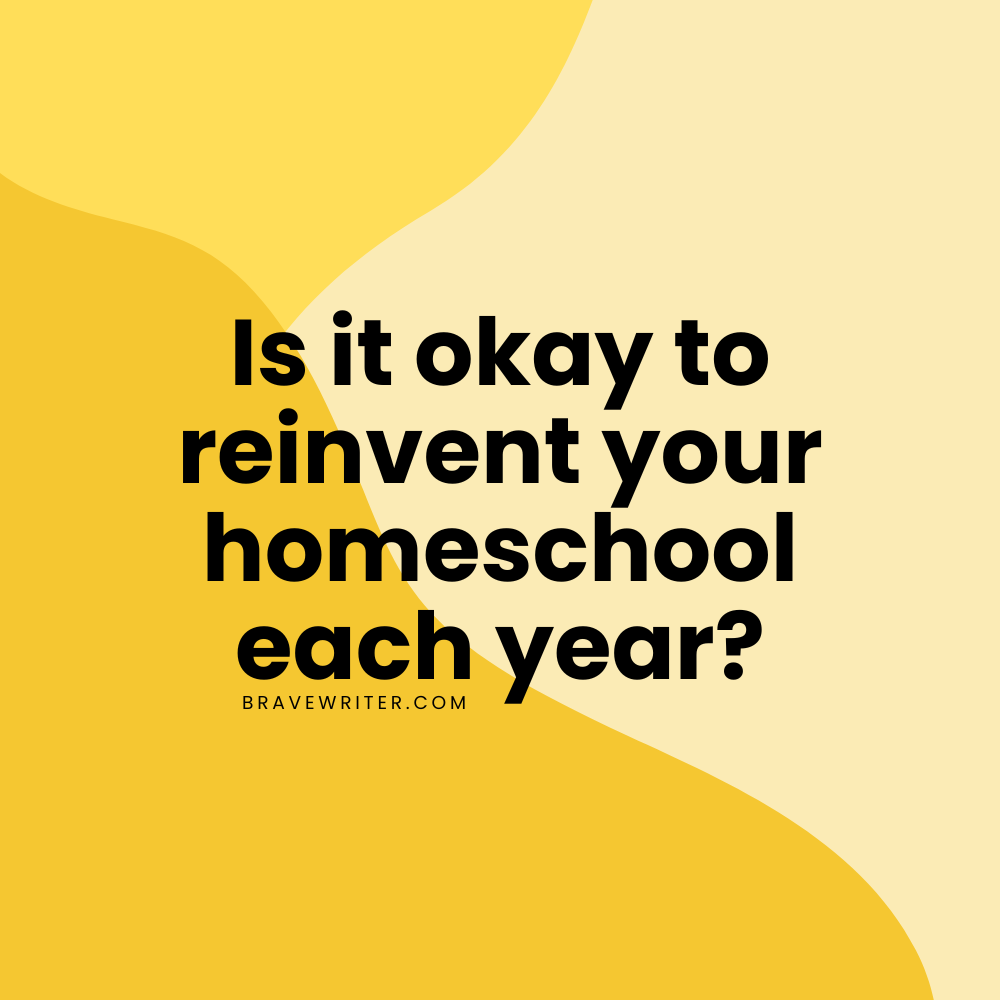
Is it okay to abandon a curriculum that worked, just because “fill in the blank”?
Maybe we:
Are tired or bored or nervous.
Have a kid who doesn’t do it the way we did it with the last four, just as we got the hang of it. (Grrr.)
Hear about someone else’s bright idea and doubt everything we’ve ever done, even while our best friend tells us we are perfect as we are. (Sure, Michelle.)
Worry that we’ll lose our friends if we change gears and try something new. (Please, don’t kick me out of forest school because I like the indoors now.)
Know this: It’s always OKAY to reinvent how you home educate.
Lean into it.
Add chocolate if needed.
The Importance of Handwriting in the Age of AI
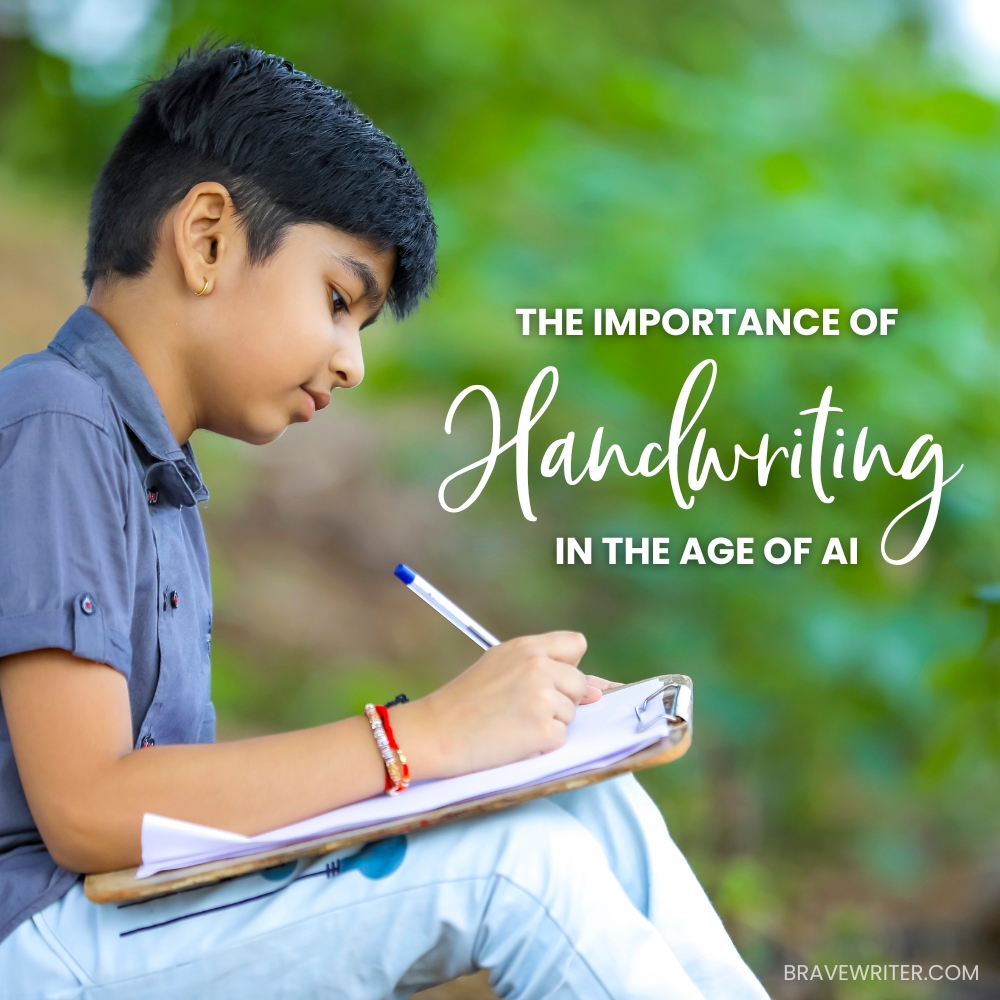
In this world of AI and voice to text, there’s one essential practice that connects your child to themselves effectively without technological interference. It’s not going outside hours a day or crafting or baking—even though those are great activities for kids.
It’s the power to put your own thoughts into honest words—privately, patiently, slowly, with skill and stamina. And while I’m a huge fan of typing, there’s a therapeutic benefit to writing by hand, old school, too.
Why bother teaching the art of handwriting?
What help is writing by hand to kids who refuse, cry, or complain that their fingers hurt?
Today, handwriting is one of the ways your child can learn about their own mind and thoughts without the suggestions of technology—no supplied words or ideas, no spelling corrections or improvements offered.
Amazingly, the brain loves it too! Handwriting lights up more areas of the brain than typing or voice to text. It anchors memory, focus, and creativity.
One of the ways we grow the handwriting skill is to make a little time and space for it each day. In Brave Writer, we do this through the rhythm of regular copywork and freewriting.
We recommend that you handwrite with your kids too.
- Put on some wordless music.
- Light a candle.
- Then simply write.
Slow the frenetic energy of life to patiently hook up a hand with a mind. See what you discover!
Even if your child struggles with dysgraphia, handwriting can be learned a little at a time. Involve a specialist for handwriting therapies tailored to your child if your child struggles excessively.
But, handwriting is now the key tool in the fight to ensure children and young adults are offering their own thinking. It’s a skill they need.
For parents of teens, check out our webinar:
High School Writing in the Age of AI
[Podcast #324] The Practice of Active Wondering
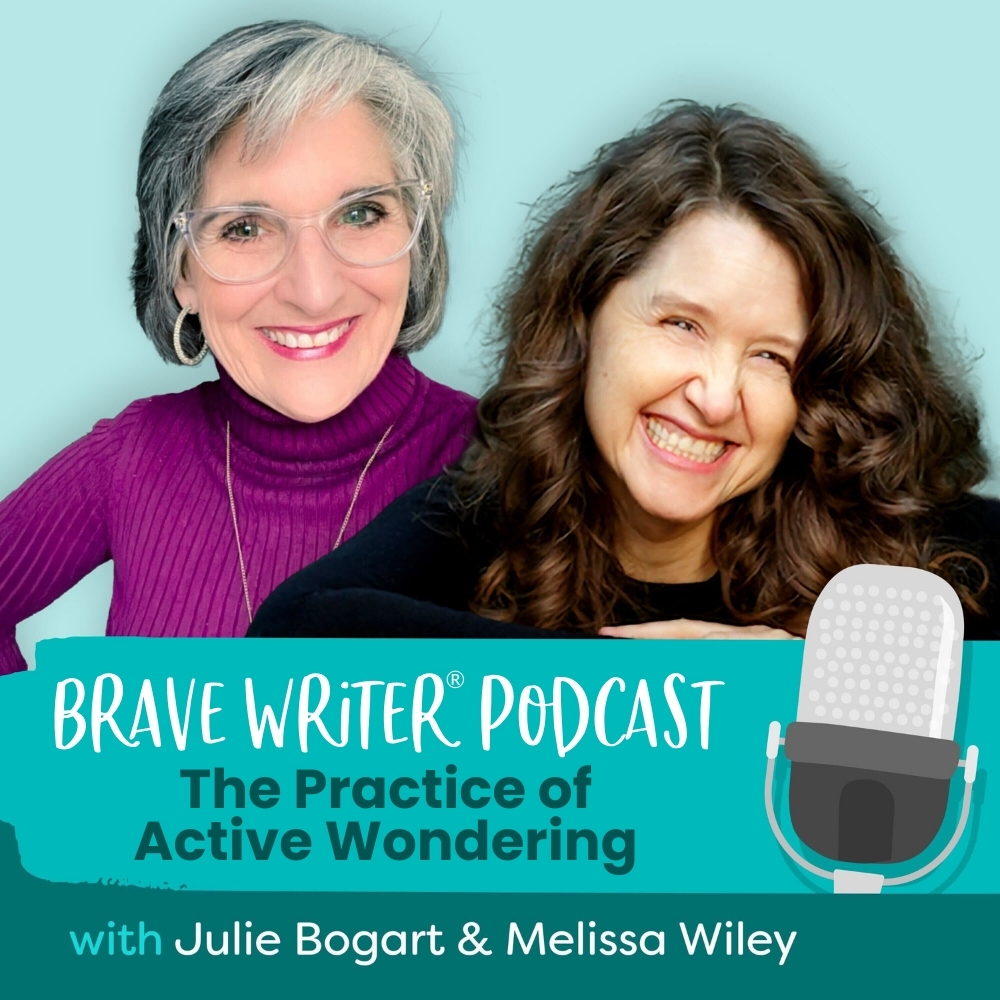
What happens when we slow down long enough to really wonder?
In this Brave Writer podcast episode, we explore the difference between rabbit trails and rabbit holes—and why both matter in learning and in life. From telephone poles and faded signs to classic children’s literature and everyday neighborhood mysteries, we reflect on how curiosity deepens when we resist quick answers and allow questions to linger.
We talk about:
- active wondering,
- mental stillness,
- and the surprising richness of slow learning in a fast world.
Join us as we rediscover how noticing, wondering, and waiting can transform ordinary moments into meaningful education.
Show Notes
Some of the most meaningful learning moments don’t begin with a lesson plan. They begin with noticing.
When we give ourselves permission to slow down, to look closely at something ordinary, and to ask questions without rushing toward answers, we step into what we like to call active wondering. This kind of curiosity isn’t passive. It’s deliberate, embodied, and alive.
Active wondering shows up when a child stares at a manhole cover and asks who put it there. It shows up when a family notices the numbers stamped on a telephone pole and starts asking why they exist at all. These moments may look like nothing is happening, but something profound is unfolding beneath the surface.
Rabbit Trails and Rabbit Holes
Learning often moves in two complementary ways. Sometimes curiosity skips from one idea to another, forming connections across subjects. These are rabbit trails. One question leads to another, then another, until a web of understanding begins to take shape.
Other times, interest pulls us into a deep dive. A single subject captures attention for weeks or months. That’s a rabbit hole. This kind of immersion allows for mastery, intimacy, and sustained focus.
Both are valuable. Together, they create a learning life that has both breadth and depth.
The Case for Slower Questions
We live in a time when nearly every answer is seconds away. That convenience is extraordinary. It’s also disruptive.
When we look things up too quickly, we sometimes lose the chance to live with a question. We skip the wondering and jump straight to the conclusion. In doing so, we miss the mental work that builds meaning, memory, and connection.
Slow questions invite observation. They ask us to notice patterns, gather context, talk with others, and return to an idea again and again. The answer matters less than the path we take to reach it.
Stillness Is Not Idleness
Active wondering requires space. That space often looks like stillness.
A child sitting quietly may not be disengaged. They may be thinking, imagining, or assembling ideas that haven’t yet found words. When we rush to fill silence with tasks or explanations, we interrupt that process.
Stillness is where creativity is born. It’s where questions arise in the first place.
Seeing the World Anew
Once we practice active wondering, the world becomes richer. Infrastructure turns into history. Small details open doors to big stories. A neighborhood walk becomes an exploration.
We don’t need special materials or elaborate plans. We only need time, attention, and the courage to let questions remain unanswered for a while.
When we model this way of learning for our children, we give them something lasting: the habit of noticing, the patience to wonder, and the confidence to follow curiosity wherever it leads.
Resources
- Listen to our episode on Rabbit Holes and Rabbit Trails
- Find John Stilgoe’s Outside Lies Magic in the Brave Writer Book Shop
- Brave Writer class registration is open!
- Visit Julie’s Substack to find her special podcast for kids (and a lot more!)
- Purchase Julie’s new book, Help! My Kid Hates Writing
- Find community at the Brave Learner Home
- Learn more about the Brave Writer Literature & Mechanics programs
- Start a free trial of CTCmath.com to try the math program that’s sure to grab and keep your child’s attention
- Subscribe to Julie’s Substack newsletters, Brave Learning with Julie Bogart and Julie Off Topic, and Melissa’s Catalog of Enthusiasms
- Sign up for our Text Message Pod Ring to get podcast updates and more!
- Send us podcast topic ideas by texting us: +1 (833) 947-3684
- Interested in advertising with us? Reach out to media@bravewriter.com
Connect with Julie
- Instagram: @juliebogartwriter
- Threads: @juliebogartwriter
- Bluesky: @bravewriter.com
- Facebook: facebook.com/bravewriter
Connect with Melissa
- Website: melissawiley.com
- Substack: melissawiley.substack.com
- Instagram: @melissawileybooks
- Bluesky: @melissawiley.bsky.social
Produced by NOVA
Student Spotlights
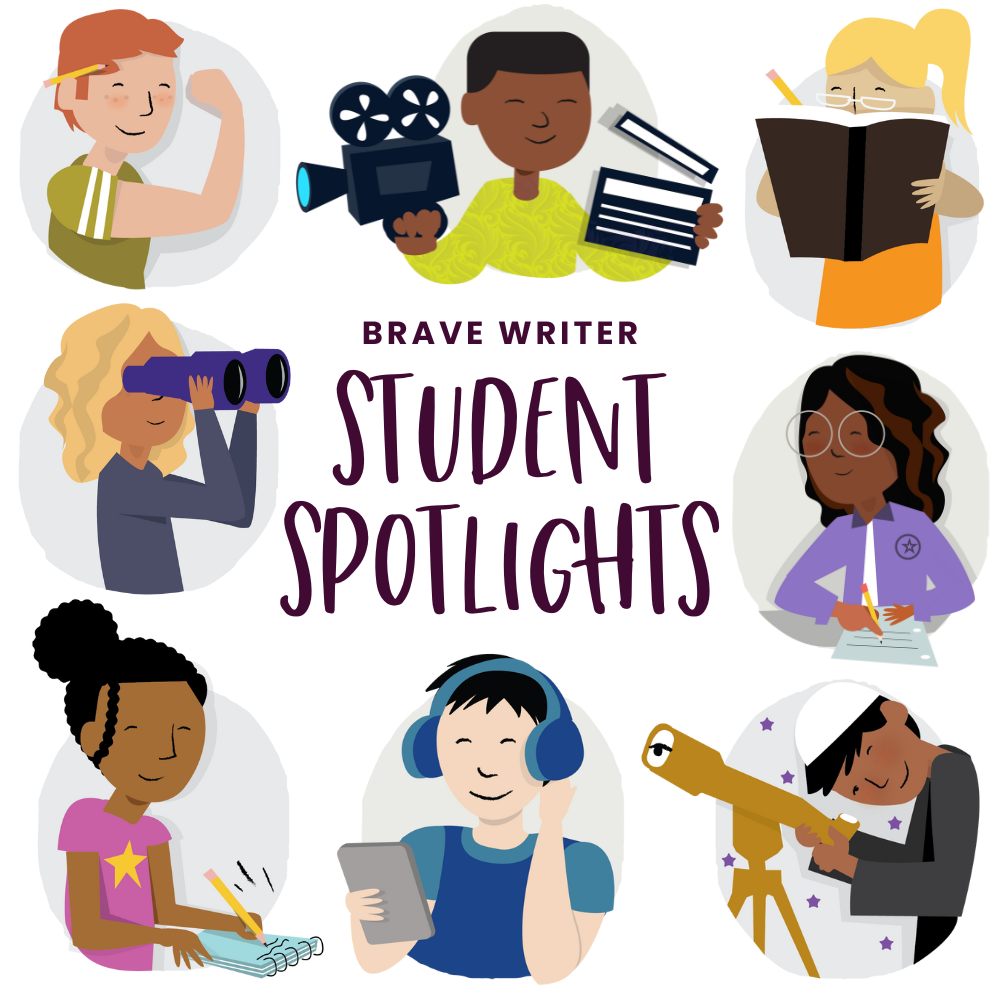
Need inspiration? Here’s a look at some of our amazing Brave Writers!
Beginning Writers (ages 5-7)
- Connecting with Kids’ Authentic Voices
- Peter Rabbit Inspired
- Animal Mini Books
- Ben, Alex, and Katey
- The Emperor’s New Clothes
- A Fun Exercise
- A Boy and the Mysterious Clock
- The real gifts of the season
- Revision: Creating a New Lens
Emerging Writers (ages 8-10)
- Cinderella Lap Book
- Creativity Is Contagious
- “Now he wants to be a writer.”
- A Story within a Story and Parenthetical Asides
- Wacky Revision
- The Winter’s Head
- Inspired to Write
- Easing Our Way Back
- Revision Example
- “The funniest way to do dictation EVER”
- Free Verse Success!
Middle School Writers (ages 11-12)
- Sonnet of the Seasons
- Freewriting: How it’s done!
- Keen Observation: Sombrero
- Missing My Friend
- Poetry on the Racquetball Court
- Partnership Writing Activity
- Partnership Writing in Action!
- Passion and Partnership
- Rebagrace
- Wild Words
- Fairytale Writing Assignment
- A Fantasy Football Cinquain!
- A New Model for Teaching Writing
- An Inspiring Young Author – Podcast with Mason Lawler
High School Writers & College Prep (ages 13-18)
- Don’t be a Perfectionist & Other Advice for Young Writers
- Help for High School Success
- Observation of an Orange!
- “She flew with it”
- From Tears to Young Author
- How Home Education Has Made Me The Person I Am
- Reading the Classics
- A College Essay that Works
- Transformation!
- “What feelings and memories do I associate with writing?”
- Revision Tactic: Change the Order
- Brave Writer and the College Admission Essay
- “The beautiful art it truly is”
- Congrats to Our Graduating Seniors
- Passion for Writing





















